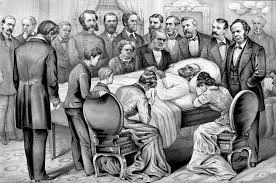During the 1880 presidential race, Charles Guiteau, a deranged former lawyer and preacher constantly hounded Republican officials for a place on James Garfield’s campaign. His contribution was microscopic but the delusional Guiteau believed he had been indispensable. After Garfield’s election, Guiteau began lobbying for a diplomatic position in Paris. 
In those days any citizen could get an appointment with the President. Guiteau entered Garfield’s office on March 10, 1881 and handed the President a copy of a political pamphlet with a request for a diplomatic posting written on the front. Before the President could finish reading the document Guiteau abruptly left the office. Weeks later, Guiteau showed up at a White House reception and tried to make his case to the First Lady. Guiteau also badgered Secretary of State James Blaine who finally told Guiteau “Never speak to me again on the subject of the Paris consulate.” Guiteau authored several letters to the President demanding that Blaine be fired prompting Garfield to instruct the White House guard to deny Guiteau further access. The increasingly unhinged Guiteau became convinced that he had been divinely ordained to “remove” Garfield and save the Republican Party.
There was no security detail dedicated to guarding the President because Americans believed that our democracy unlike monarchies was immune to political violence. Abraham Lincoln’s murder, sixteen years earlier was thought to be an act of war as it was committed by a confederate sympathizer just days after the Civil War ended. Why would anyone want to kill the President when he could be voted out of office?
On July 2, 1881, four months into his presidency, James Garfield was walking through a Washington train station with his two teenage sons when he was shot by Guiteau.
Malpractice
A medical team led by Willard Bliss started the task of locating the bullet lodged in the President’s body. Garfield was moved to the White House where the doctors continually probed his body with their unwashed fingers. The physicians ignored the recent teachings of surgeon Joseph Lister who had determined that doctors should thoroughly wash their hands and instruments before touching a patient. By 1881, Louis Pasteur and Robert Koch had gained fame for demonstrating the germ theory of disease however the Garfield team disregarded anti-septic techniques.
In mid-July, Alexander Graham Bell who had just achieved fame for his telephone informed Dr. Bliss that he might be able to locate the bullet with an electronic device that detected metal. Bliss initially declined Bell’s offer but within a few weeks grew desperate and summoned the inventor to the White House. Bell’s first attempt to locate the bullet was unsuccessful but after some fine-tuning in his workshop offered to try again. The possessive and insecure Bliss never gave Bell a second chance with Garfield. Bell’s metal detector would eventually prove invaluable to battlefield doctors and helped uncover land mines in World War I.
The doctors’ inattention to anti-septic techniques accelerated Garfield’s agony. He suffered for eighty days with excruciating pain, blazing fevers and unrelenting chills while wasting away from 200 to 130 pounds. On September 6, the President was transported to a seashore cottage in Long Branch, New Jersey where he finally passed away on September 19, 1881.
Post Scripts
In the three months that Garfield lingered in agony the nation was effectively without a President. Vice President Chester Arthur refused to take office while Garfield was alive as there was no guidance in the Constitution for presidential incapacitation. Four hours after Garfield’s death, Arthur took the oath.
Guiteau was one of the first defendants to plead not guilty by reason of insanity however he was found guilty and hanged.
It was not until the assassination of President William McKinley in 1901 that Congress assigned the task of presidential protection to the Secret Service, an agency that had originally been created to combat counterfeiting.
Secretary of War Robert Todd Lincoln, the son of the martyred 16th President was speaking with Garfield when the assassination occurred. Incredibly, twenty years later, Robert Lincoln was present at President McKinley’s assassination in Buffalo, New York.
Have a great weekend. If you are looking for top-notch marketing support, contact ted@blackdotmessaging.com
|